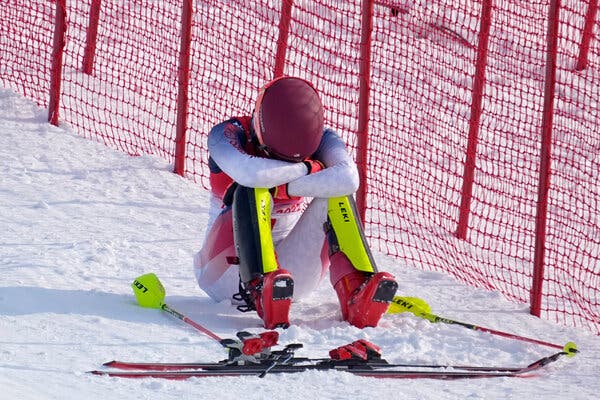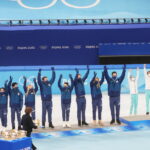
It was a heartbreaking end, Mikaela Shiffrin’s second early exit from an Olympic race in three days. But Shiffrin was not ready to move on. Not just yet.
Frustrated and bewildered by a Beijing Olympics dream going wrong in real time, Shiffrin sat down in the snow next to the slalom course on Wednesday morning and buried her head between her bent knees. She remained there for more than 20 minutes as some of her rivals whizzed past, lost in her thoughts and her disappointment and trying to figure out what had gone wrong.
When she finally came down the hill, Shiffrin didn’t have answers.
“I had the intention to do my best skiing and my quickest turns,” Shiffrin told reporters, fighting back tears. “But in order to do that, I had to push the line, the tactics. And it is really on the limit then. And things happen so fast that there was really not space to slip up, even a little bit.”
Nothing in Shiffrin’s professional career would have portended the series of quick, complete, recurring disappointments she is enduring this week on her sport’s biggest stage. Slalom is ski racing’s most dauntingly precise discipline, but for Shiffrin, a two-time Olympic champion and the most decorated slalom skier in history, to last only five seconds in her best event was almost unfathomable.
As Shiffrin wiped away tears on live television, friends and strangers and others rallied to her side. Her boyfriend, the Norwegian skiing star Aleksander Aamodt Kilde posted a supportive message on Instagram alongside an image of Shiffrin sitting alone in the snow.
“When you look at this picture you can make up so many statements, meanings and thoughts,” he wrote. “Most of you probably look at it saying: “she has lost it,” “she can’t handle the pressure” or “what happened?”… Which makes me frustrated, because all I see is a top athlete doing what a top athlete does! It’s a part of the game and it happens.”
The gymnast Simone Biles, who withdrew from several events in last summer’s Tokyo Games because of a mental block that prevented her from competing safely, offered three white hearts on Twitter.
Shiffrin, meanwhile, vowed to press on. She has three Olympic races left if she chooses to enter them, something that no longer seems a certainty. After her race on Wednesday, she appeared shaken and confused. In tears as she spoke with reporters, she did not hide her heartbreak.
“I will try to reset again and maybe try to reset better this time,” she said. “But I also don’t know how to do it better, because I just don’t. I’ve never been in this position before, and I don’t know how to handle it.
“If I am going to ski out on the fifth gate, well, what’s the point?”
At the same time, another Olympic race went on without her. Petra Vlhova, who has had a pitched rivalry with Shiffrin throughout this season, came back after an erratic first run to win Wednesday’s slalom, becoming the first Alpine Olympic medalist from Slovakia. Katharina Liensberger of Austria was in second place, eight hundredths of a second behind, just a fraction of a second faster than Wendy Holdener of Switzerland, who won the bronze.
Shiffrin, who was expected to contend for multiple gold medals at these Games, had trouble in Wednesday’s run almost from the beginning, with her feet and arms not in sync, her balance teetering and the gates seeming to come at her faster than she could react. She nearly fell rounding the fourth gate, and while she was still upright, her usually composed bearing was harried. As she passed the fifth gate, she was heading for the side of the trail and knew her race was over. She was disqualified before the sixth gate.
Her speech irregular, her voice pained, Shiffrin explained in an interview what she had been thinking about while she sat on the side of the trail. She said she was overcome by a feeling of having let herself and others down.
“I was trying to look back and think back on the last days,” she said, “and think what I have been trying to do and what I have been doing with my skiing that would suggest that on the fifth gate I would push myself a little bit too hard to actually not be able to stay on the course.”
Shiffrin, 26, won the 2014 Olympic Games slalom and has dominated the event ever since, winning more World Cup slalom races, 47, than any other racer, male or female. She rarely makes mistakes; when she failed to finish a slalom early last month, it was the first time that had happened in nearly four years.
Shiffrin has spent the past weeks talking extensively about all the external obstacles that could prevent her from having success at these Games. She tested positive for the coronavirus in December and was dreading the logistical issues involved with getting to China and the pandemic protocols of life at these Olympics.
In her first days at the Games, she often discussed the wind and the randomness of what could transpire on a gusty mountain. But none of those factors have come into play here, and on Wednesday she tried to brush them aside.
“It’s not the end of the world,” Shiffrin said, trying to laugh at herself — or perhaps trying to convince herself. “And it’s so stupid to care this much. But I feel that I have to question a lot now.”
Shiffrin has won three medals in two previous Olympics, but these are the first since the death of her father, Jeff Shiffrin, two years ago. That did not escape her mind as she prepared to leave the race area on Wednesday.
“Right now, I would really like to call him,” Shiffrin said.
Run 1 |
Run 2 |
Time |
||
|---|---|---|---|---|
|
Petra Vlhova Slovakia |
52.89 | 52.09 | 1:44.98 | |
|
Katharina Liensberger Austria |
52.83 | 52.23 | 1:45.06 | |
|
Wendy Holdener Switzerland |
52.65 | 52.45 | 1:45.10 |




